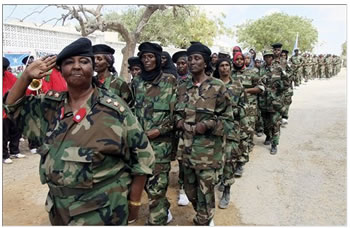
By MALKHADIR M. MUHUMED
Saturday, April 16, 2011
Somalia's most dangerous Islamist group is facing its first serious threat in years following an offensive by pro-government forces, officials and observers say.

Somali women soldiers march near southern Mogadishu's Villa Biadio, Somalia, Tuesday April 12, 2011, during a commemoration ceremony for the 51st Anniversary of the Somali armed forces.
Al-Shabab has been beaten back from areas of the capital, Mogadishu, and in regions of southern Somalia. The battlefield defeats are its first major setbacks since it overtook large portions of Mogadishu two years ago.
Since then, the group has appeared to entrench its position in Somalia, enforcing Sharia law, setting up courts and ordering punishments. The group also claimed responsibility for a double suicide bombing in Uganda last year that killed 76 people during the World Cup final.
"Al-Shabab is not that strong. It is divided internally, brutal and ham-handed, deeply unpopular among the people under its control, and not providing anything to Somalis in terms of vision, services, or security," said Jennifer Cooke, director of the Africa program for the Washington-based Center for Strategic and International Studies.
Though the pro-government forces have the momentum, some analysts don't consider the quick gains to be long-lasting wins.
Roland Marchal, a Somalia expert at the Center for International Studies and Research in Paris, points to the fact that the forces that routed al-Shabab from the border town of Belet Hawo and most of Somalia's southern Gedo region are not government troops but militia members.
"There is no way al-Shabab could be defeated this way. They're weakened, yes. But you need the vacuum created by military victories to be taken by new legitimate political authorities, and we have a long way to go to reach that point," said Marchal.
Sheik Ali Mohamud Rage, al-Shabab's spokesman, blamed his group's recent failures on Ethiopia, a common strategy used by militants to drum up nationalistic support. Ethiopia supports militiamen who oppose al-Shabab and its forces have fought alongside pro-government militias to prevent al-Shabab from establishing permanent bases near its borders.
Like the Taliban in Afghanistan or militants in Iraq, members of al-Shabab don't wear uniforms and can easily put down their weapons and blend in with villagers when threatened, one reason no one knows if the recent military gains will last or if the insurgents are biding their time before regrouping.
A website that claims support for al-Shabab - Somalimemo.net - last month published a detailed military strategy aimed at helping militants pull off gains without suffering losses.
The five-page plan urges fighters to divide into units and "not to engage in a face-to-face battle - only hit-and-run attacks - to preserve energy." It also counseled fighters to carry out ambushes along main roads and in towns.
"There is no doubt that those small units will have a major effect on the power and morale of enemy troops on the front lines, something that will stop them from continuing their advance," the document continued.
Analysts have long argued that al-Shabab lacks the popular support that would allow it a long existence as al-Qaida's representative in East Africa. The militants also lack a reliable supply chain that could help fighters repel a sustained offensive on multiple fronts.
"Any organization that uses an ideology of fear cannot survive for long because the population will finally understand the hidden interests of its artificial war," said Barigye Bahoku, the spokesman of the African Union peacekeepers in Mogadishu, adding that al-Shabab's strength "is at best a myth and artificial at worst."
The group's fighters are estimated to number between 5,000 to 7,000 men, but analysts say only a few hundred of them - mostly foreign fighters from war zones in Iraq and Pakistan - are highly trained.
Al-Shabab may only appear strong because the Somali government, known as the Transitional Federal Government, is so weak. It relies on the 9,000-strong African Union force to prop it up.
Somalia has been mired in violence since 1991, when clan-based warlords toppled dictator Mohamed Siad Barre and then turned on each other.
"Without the presence of the African Union, the TFG would very likely have been overrun by now, and that reliance on external support has made the TFG leadership very complacent in building domestic legitimacy or alliances or giving Somalis any confidence in its ability to govern," said Cooke.
Bahoku said Somalia's government needs "political cohesion and unity of purpose" to build on the recent battleground gains.
The international community has always said that there is no military solution in Somalia. Rashid Abdi of the International Crisis Group said a military force is needed to knock out the hardcore fighters, but that moderate insurgents needed to be absorbed by a reconciliation process.
Former Islamists who fought Ethiopian forces from 2006 to 2007 say al-Shabab fighters have little chance to effectively regroup if they are overpowered this time around.
"If al-Shabab is defeated today no tears, even a crocodile one, will be shed for it. I'm sure majority of the population will shout 'good riddance!'" said Abdifatah Hirsi Mohamed, who is part of a militia group trying to retake several southern regions, including the port city of Kismayo, from the militants.